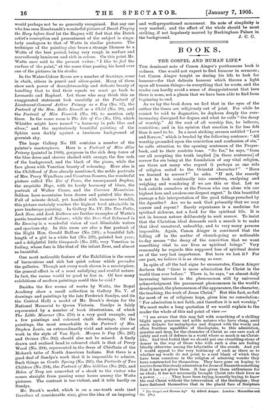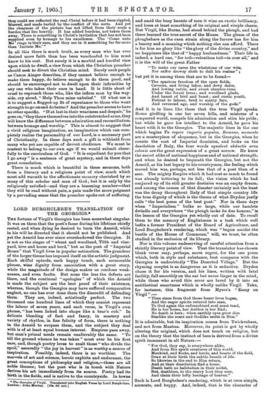THE dominant note of Canon Ainger's posthumous book is sadness.
One would not expect to find humour in sermons ; but Canon Ainger taught us during his life to look for humour—for that delicate humour which throws a light upon all human things—in everything that he wrote, and the reader can hardly avoid a sense of disappointment that here there is none, not a gleam that we have been able to find from beginning to end.
As we lay the book down we feel that in the eyes of the author the times are religiously out of joint. For while he cannot be said to dogmatise, he deplores deeply the ever- increasing disregard for dogma and what he calls "the decay of worship." At the root of all worship lies, he believes, contrition; and in his opinion that emotion is far less felt than it used to be. In a most striking sermon entitled "Love and Sorrow," which is headed by the following sentence: "All worship grounded upon the conviction and confession of sin," he calls attention to the opening sentences of the Prayer- book, and to their contrite tone. "So far," he says, "from our all accepting the truth implied [in these sentences] of sorrow for sin being at the foundation of any vital religion, are there not many who regard it perhaps as one side of religion suited to the Oriental character P " "Have we learned to sorrow ?" he asks. "If not, the remedy is not to look continually into ourselves, analysing and weighing and wondering if we are this or that. Let us look outside ourselves at the Person who can alone win our highest love and awaken our deepest regret." Is this beautiful passage a fair interpretation of the good tidings preached by the Apostles? Are we to seek God primarily that we may sorrow and repent? Surely repentance is a medicine for spiritual sickness, not a food for the spiritual life. It is not in human nature deliberately to seek sorrow. To insist that the Christian ideal demands such a search is to make that ideal unnatural, unhealthy, and to very many persons impossible. Again, Canon Ainger is convinced that the falling off in the matter of church-going so noticeable to-day means "the decay of the conviction that we want something vital to our lives as spiritual beings." Very reasonably he regards this supposed loss of spiritual desire as of the very last importance. But have we lost it ? For our part, we believe it is as strong as ever.
In spite of all the bad signs he enumerates, Canon Ainger declares that "there is more admiration for Christ in the world than ever before." There is, he says, "an almost daily increasing interest in the phenomenon still by universal acknowledgment the paramount phenomenon in the world's development, the phenomenon of the appearance, the character, the teaching, the work of Jesus Christ." But this fact, so full for most of us of religious hope, gives him no consolation: "For admiration is not faith, and therefore it is not worship." We must make a long quotation if we would explain to the reader the whole of this sad point of view :—
" I am aware that this may fall with something of a chilling blight upon generous and noble natures who have clung, amid much distaste for metaphysics and disgust with the wordy and often fruitless squabbles of theologians, to this admiratimi, genuine and deep, for the character of Christ as one sure rock of safety and rock of defence in a world where so much is un-Christ- like. And God forbid that we should put one stumbling-stone of demur in the way of those who with such a clue are feeling blindly otherwise among the labyrinths of the creeds. And yet I would appeal to the very testimony of such as these as to whether my words do not point to a real blank of which they have been conscious in the religion of admiring wonder they have constructed for themselves. They have gone on hoping to receive from this steady admiration for Jesus of Nazareth something that it has not given them. It has given them enthusiasm for an ideal ; it has not necessarily brought Christ into their lives as
a power They have been trying, honestly trying, to know the real Christ without the intervention of the theologian ; they have flattered themselves that in the placid face of Scripture
* The Gospel and Human Li,f• By Alfred Ainger. London : Macmillan and Co. Os.] they could see reflected the real Christ before it had been rippled, blurred, and made turbid by the conflict of the sects. And yet the clearness of the picture has not lifted from their souls a burden that lies heavily. It has added burdens, not taken thorn away. There is something in Christ's invitation that has not been supplied even by homage to his excellence. The Come unto Me' rings in their ears, and they see in it something far far more than 'Imitate Me."
In all this there is much truth, as every man who has ever desired more faith than has been vouchsafed to him must
know to his cost. But surely it is a morbid and hurtful view upon which to dwell, a view from which the Christian preacher should seek to divert the Christian mind. Surely such people as Canon Ainger describes, if they cannot believe enough to make them happy, do believe enough to do them good, and should be encouraged not to dwell upon their infirmities by any one who takes their cure in hand. It is little short of cruel to reproach those who, like the infirm man by the way- side, cry aloud, "Help Thou mine unbelief." Of what use is it to suggest a flogged-up fit of repentance to those who want strength to go on and do better? And the preacher seems to have no other specific. "If at last in their weariness and despair," he goes on," they throw themselves into the outstretched arms, they will know the difference between admiration and reconciliation, between homage and worship." This is almost to suggest that a vivid religious imagination, an imagination which can com- pletely realise the personality of our Lord, is a necessary part of Christianity. In these days such a gift is withheld from many who yet are capable of devout obedience. We must be content to belong to our own age if we would submit cheer- fully to the curriculum of God. "It is expedient for you that I go away" is a sentence of great mystery, and in these days great consolation.
There is much which is beautiful in these sermons, both from a literary and a religious point of view, much which must add warmth to the affectionate memory cherished by so many of this scholar and man of God; but it is only by the religiously satisfied—and they are a lessening number—that they will be read without pain, a pain made the more poignant by a pervading sense that the preacher spoke out of suffering.















































 Previous page
Previous page